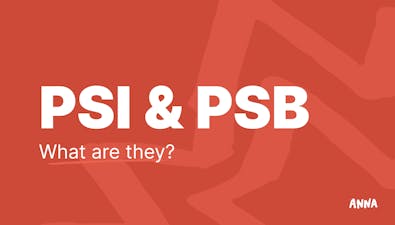
Entity name vs Business name - What's the Key Difference?


Compare entity names and business names, understand their key differences, legal implications, and how to choose the right one for your business.
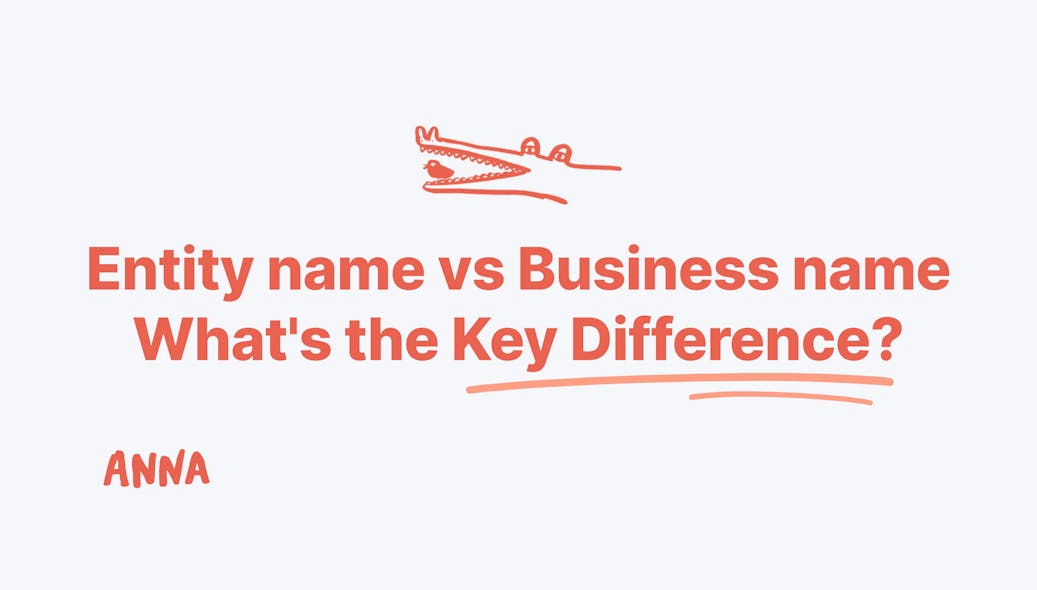
- In this article
- Why Is It Important to Understand the Difference Between Entity Name and Business Name?
- What Is an Entity Name?
- What Is a Business Name?
- Key Differences Between an Entity Name vs a Business Name
- What to Do If You Have Multiple Services: One Business Entity or Multiple Business Names?
- Entity name vs Business name: Which Is Easier To Register?
- Conclusion
- How Anna Money Can Assist You?
- FAQ
Do you believe in myths like registering an entity name automatically protects your business name or that registering a business name grants you exclusive rights?
If so, you’re in the right place because today, we’re going to break them all!
In this article, you’ll learn the key differences between an entity name and a business name, when to use each, how to register them properly, and how to simplify the entire process of starting a business with one easy solution.
Stick around until the end, and you can get all the answers you need!
Let’s start!
Why Is It Important to Understand the Difference Between Entity Name and Business Name?
Understanding the difference between an entity name and a business name is important for legal compliance, operational clarity, and brand protection. Here's why.
✅ Legal compliance is critical since entity names are legally registered identities with ASIC, and business names are the public-facing names under which the business works. Failure to register a business name when necessary can result in fines or invalid contracts, so understanding the distinction is important to maintaining legal and financial protection.
✅ Operational clarity is important since entity names describe the legal structure, and business names shape brand identity. Companies frequently use business names to simplify branding, such as "Apple" rather than "Apple Inc.," and franchises or subsidiaries may operate under different business names while still being part of a single legal entity.
✅ Registering a business name does not give exclusive rights; rather, it identifies the legal entity behind the name. To protect trademarks, you, as a business owner, must register name or logo separately with IP Australia.
💡 Pro Tip
ANNA Money can simplify trademark registration in 3 steps:
1. Submit your application online.
2. Give us some information about your business.
3. Get your trademark certificate when it is done
Get your early access here!
What Is an Entity Name?
An entity name is the legal name of a registered business entity, like a company, a partnership, or a sole trader.
What are the main characteristics of an entity name?
1. Legal Identity
✅ Companies' entity names include legal terms such as "Pty Ltd" or "Ltd" (for example, "ABC Pty Ltd").
✅ If you are a sole trader, then it is your complete legal name (e.g., "Jane Doe").
✅ If you chose partnership, it is the names of all partners (for example, "Jane Doe and John Smith").
2. Usage - Businesses use entity names for official and legal purposes, including contracts, invoices, tax filings, and bank accounts, to establish a legally recognised identity.
3. Registration - Registration is mandatory for all business entities in Australia, ensuring legal recognition and compliance with the Australian Securities and Investments Commission (ASIC).

💡Pro Tip
With ANNA Money you can very easily check the availability of names and choose the right one!
All you have to do is type in the desired name and choose the type of company you are opening.
After that, click on "Check availability" and wait for the results for a few seconds 👇
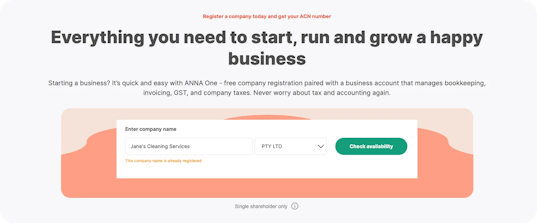
🟢 - Green indicates that the name is not registered.
🟠 - Orange indicates that the company name is already registered.
What Is a Business Name?
A business name is a name or title under which a business operates and which the general public recognises. It is distinct from a legal entity's name and must be registered with the Australian Securities and Investments Commission (ASIC) unless certain exceptions apply.
Sole traders or partnerships that use their personal names as their business names are free from registering.
What are the main characteristics of a business name?
1. Purpose - A business name acts as the company's public-facing identity, allowing customers to recognise and engage with it. It is intended for branding and marketing purposes.
2. Registration Requirement - Businesses must register their names with ASIC unless they use their complete legal name (for example, "Jane Smith" for a sole trader).
3. Renewal - Business names must be renewed on a regular basis to retain registration.
4. Trademark Protection - To protect the name, businesses must file for a trademark with IP Australia.
➕Bonus Tip
Before registering, first, check that the chosen name is accessible on ASIC's Business Names Register and that it does not infringe on existing trademarks. How to check?
1. Visit the ASIC site and find “Search business names register”
2. In the tab “Search Within”, choose “Check business name availability”
3. Type the name and click “search”
4. Scroll down and check the results:
🔴 The business name is taken.
🟢 The business name is free to use.
🟡 The business name requires manual decision-making, meaning an ASIC staff member needs to review it before approval.
Key Differences Between an Entity Name vs a Business Name
Let's break down these differences:
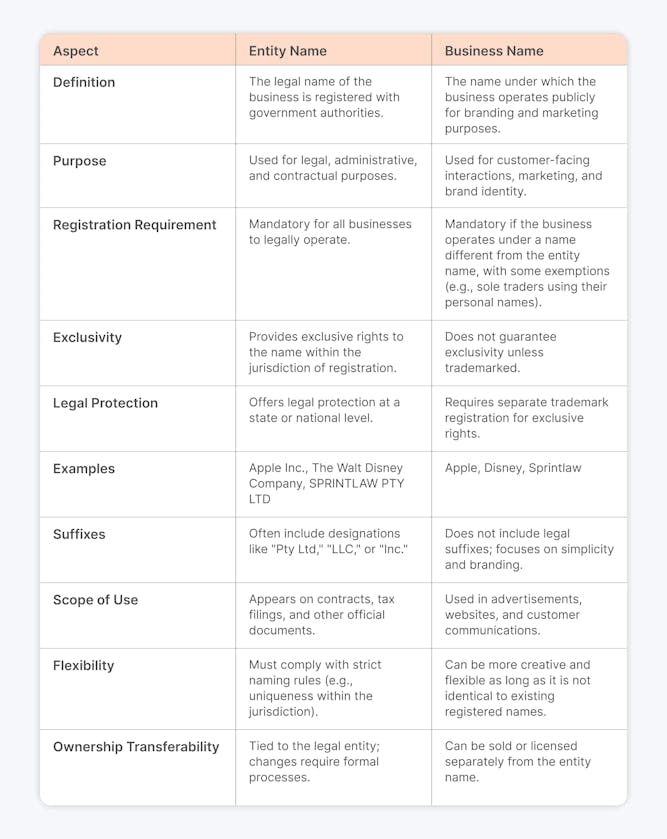
What to Do If You Have Multiple Services: One Business Entity or Multiple Business Names?
Here’s a breakdown of the advantages and disadvantages of using one business entity vs separate entities for different services in Australia:
1. One Business Entity with Multiple Business Names
Advantages:
✅ Cost efficiency:
- Reduces registration fees for multiple ABNs or businesses.
- Reduces the need for several tax returns.
✅ Centralised compliance (such as ASIC updates and licensing).
✅ It is easier to handle branding with a unified structure.
✅ Target diverse markets using distinct business names (for example, "ABC Café" and "ABC Catering").
✅ Scalable for short-term projects or piloting new services.
✅ Combine assets, employees, or equipment across services.
Disadvantages:
❌ Debts or legal concerns from one service may affect others within the same business. For example, a failing café could jeopardise a successful catering business.
❌ Unrelated services (such as construction and retail) may distort client impressions.
❌ There is no asset separation; everyone is exposed to the risks associated with any service.
❌ Selling or quitting one service may necessitate restructuring the entire entity.
2. Separate Business Entities
Advantages:
✅ Isolate risks; the obligations of one service will not influence the others. For example, a lawsuit against a construction company will have little effect on a retail business.
✅ Distinct entities make customer understanding easier (for example, "Smith Builders" vs. "Smith Retail").
✅ It is easier to sell, merge, or exit individual businesses without harming others.
✅ Strategically distribute earnings and losses between entities.
Disadvantages:
❌ Registration expenses for multiple ABNs, businesses, or trusts.
❌ Separate your tax returns and compliance filings.
❌ Manage several ASIC registrations, licenses, and bank accounts.
❌ Each entity has redundant staff, equipment, or systems.
❌ It is time-consuming to track funds, insurance, and compliance across multiple entities.
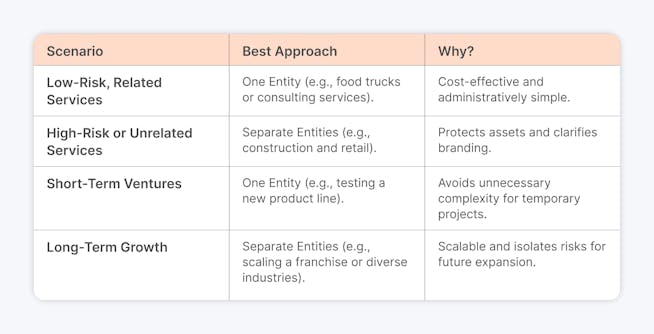
Entity name vs Business name: Which Is Easier To Register?
In Australia, registering a business name is typically easier and faster than registering an entity name (such as a company). Below is a breakdown of the procedure and complexity for each:
1. Business name
Once you check the name availability, the next step is to apply via ASIC Connect:
1. Submit details (name, holder’s information, addresses) and pay the fee:
- $44 for 1 year
- $102 for 3 years
Requires an ABN (apply simultaneously if needed).
Advantages
✅ Simpler: No complex legal structures or director requirements.
✅ Cost-Effective: Lower fees compared to company registration.
✅ Processing: Approved within 48 hours.
2. Entity Name Registration (e.g., Company)
Follow these steps:
- Choose a Structure: Decide on a company type (e.g., Pty Ltd, proprietary limited).
- Check Name Availability
- Apply via ASIC Connect: Submit details (directors, shareholders, addresses) and pay the fee (~$597 for a proprietary company).
Requires an ACN (Australian Company Number).
Advantages
✅ Liability Protection: Shareholders are not personally liable for company debts.
✅ Processing: Approved in 2 business days.
✅ Tax Benefits: Companies pay corporate tax rates (lower than individual rates for higher incomes).
Disadvantages
❌ Complexity: Requires directors, shareholders, and compliance with corporate laws.
❌ Cost: Higher registration fees and ongoing reporting obligations.
💡 ProTip
With ANNA Money, you can easily open a company with two package options:
- Easy Company – Start your company for just $288.
- ANNA One – For $599 (one-year introductory fee), get company registration plus business support.
Best of all, the ASIC fee of $576 is covered in both packages!
Conclusion
As you can see, understanding the difference between an entity name and a business name is important, but it's not the biggest challenge in running a business, right?
It doesn't matter if you're managing a small business or a large company, you have to navigate through lots of laws, paperwork, taxes, and regulations.
Keeping track of everything can be overwhelming, and who can handle it all at once?
Don’t worry, ANNA Money can!
From company registration to business management, we make running your business easier.
Take a look and see how we can help! 👇
How Anna Money Can Assist You?
Besides checking the name for you and opening a company, ANNA Money can help you with lots of things when it comes to business. After all, its name stands for “Absolutely No Nonsense Admin”!
⚡ ABN registration - With ANNA Money, you can easily register your ABN, manage your funds, and keep track of your tax reporting.
⚡ ACN registration - Register your company, acquire your ACN number in minutes, and increase your business credibility.
⚡ Business account - After registering your business, you can easily open an ANNA business account, acquire a unique business debit card, and start making payments.
⚡ ANNA +Taxes - ANNA +Taxes solves all of your tax needs, including payroll, GST filing, and Corporation Tax.
⚡ Receipt scanner - Take a photo and it will automatically link receipts to transactions in your company account, categorising them for proper tax calculations.
⚡ Tax calendar - Never miss another tax date, and ensure timely compliance with all of your tax requirements.
⚡ Bookkeeping Score - Stay on top of your bookkeeping and receive easy tips to keep your books neat.
⚡ Business documents - Keep receipts, invoices, and company records in one location. We will check for matching transactions, extract crucial facts, and ensure that everything is easy to find and share.
Sounds helpful?
Sign up and simplify your business right away!
FAQ
Is Entity Name Actually a Company Name?
An entity name is not always the same as a company name, though it may be depending on the business structure.
All company names are entity names, however, not all entity names are company names.
Sole traders and partnerships have entity names but do not have company-specific identifiers like "Pty Ltd".
Can I Use a Business Name That Exists in Another State?
You can’t use a business name that has already been registered anywhere in Australia, even if it is in another state. If the current name is slightly different (e.g., "Melbourne Café" vs. "Sydney Café"), you may register it, but it must not violate trademarks or cause consumer confusion.
What Happens If I Use The Same Name For Both My Entity And Business?
Using the same name for your company and business is convenient for simplicity, but it requires careful planning to avoid legal disputes or branding issues.
For businesses with a wide range of services or long-term expansion ambitions, separating the legal corporation name from the public-facing business name may provide more flexibility. Always get legal advice to guarantee compliance with naming laws and intellectual property protection.
How Can I Protect My Business Name at Both the State and Federal Levels in Australia?
To protect your business name in Australia, focus on federal-level protections since business name registration is national, and state-level protections are limited. Here’s how to secure your name effectively:
1. Register Your Business Name Nationally
2. Trademark Your Business Name
3. Secure Domain Names


